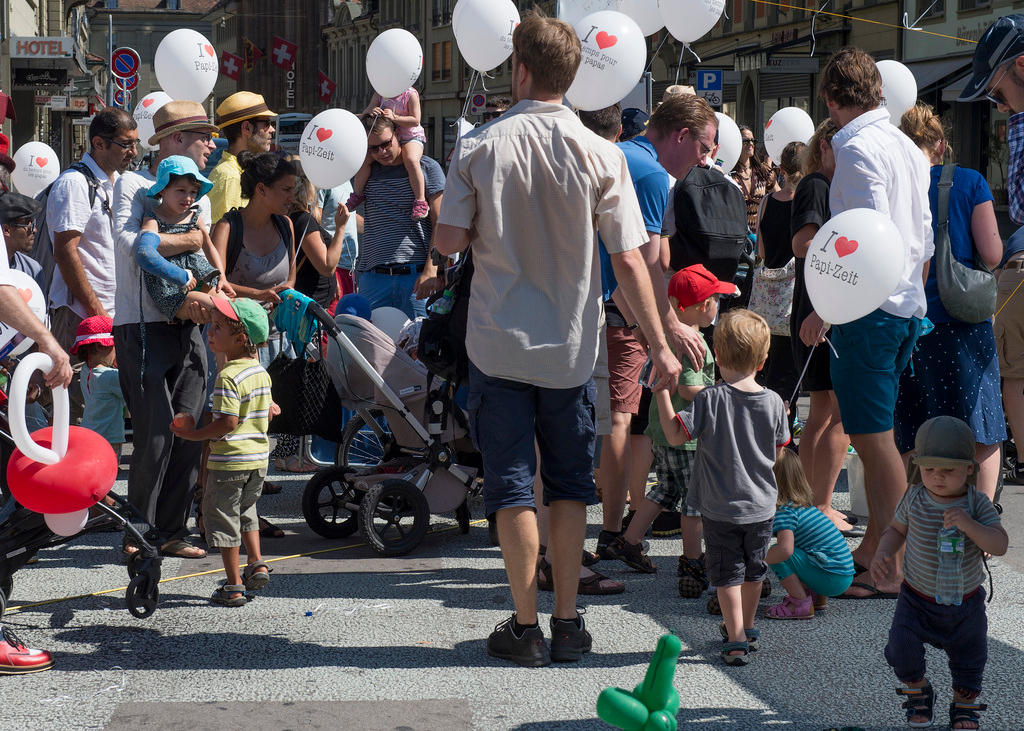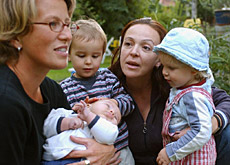Paid leave for dads wins broad public support

Swiss voters will have the chance to overturn parliament’s rejection of paid paternity leave after campaigners fighting to introduce the benefit collected more than the minimum number of signatures well ahead of the deadline.
About 130,000 signatures were collected by the Paternity Leave Now! campaign committee – 30,000 more than the required amount – and handed in to the Federal Chancellery on Tuesday.
Adrian Wüthrich, head of the campaign committee, said the overwhelming public support for 20 days of paid leave for fathers allowed it to submit the signatures six months ahead of the deadline. A date for the vote will be set by the government at a later stage.
“It literally didn’t matter where our activists were campaigning,” he says. “Often people came up to us before we were ready with our stands and leaflets.”
Wüthrich, president of the trade union umbrella group, Travail Suisse, and active in local and cantonal politics for the Social Democratic Party, says that he can’t remember campaign success on a similar scale over the past 20 years.
Pedestrian zones in city centres, public parks, playgrounds as well as party or trade union events and even trade fairs were hunting grounds for the activists.
Modern tools
Social media also helped to facilitate the collection of signatures. People could order the required material online, add their names, sign the sheet and forward it to the campaigners.

Wüthrich says they had about 59,000 requests for documents and about 28,000 sheets were sent back.
“The online campaign was an important element in our strategy but it can’t replace action on the ground and in the streets,” he said.
Wüthrich added that people who wouldn’t sign didn’t seem necessarily opposed to the idea, but were rather indifferent. On an occasion captured on camera by public television, a woman declined to sign saying she and her family would not be able to benefit from paternity leave. She then changed her mind, either due to the presence of the camera or Wüthrich’s arguments.
Compromise
It wasn’t until 2005 that statutory maternity leave was introduced in Switzerland – a full six decades after the benefit was enshrined in the country’s constitution.
Politicians have also given supporters of paternity leave a hard time. Parliament has thrown out more than 30 proposals for either paternity leave or parental home care over the past few years. But after the refusal a year ago by the House of Representatives to consider such a benefit, an alliance of 140 organisations joined forces to launch the initiative.
Wüthrich says the demand for a 20-day leave is a typical compromise.
“Some groups within the alliance wanted to set the bar higher, while others thought 20 days was already too ambitious.”
The costs for the benefit as foreseen by the campaigners is estimated at CHF380 million ($396 million) annually, through contributions by employers and employees. The scheme is similar to the paid maternity leave.
Although maternity benefit was anchored in the Swiss constitution in 1945, voters refused to approve the necessary laws in four nationwide votes before the turn of the millennium.
Comparison
When it comes to paid paternity leave, Switzerland is bottom of the table together with the United States, Germany and Japan in an international comparison of industrialised countries.
However, a survey published by the SonntagsZeitung newspaper shows that paternity leave granted by some major private as well as public employers – cantons, cities, municipalities and state-owned companies – vary between one and 21 days.

In compliance with the JTI standards
More: SWI swissinfo.ch certified by the Journalism Trust Initiative













You can find an overview of ongoing debates with our journalists here . Please join us!
If you want to start a conversation about a topic raised in this article or want to report factual errors, email us at english@swissinfo.ch.